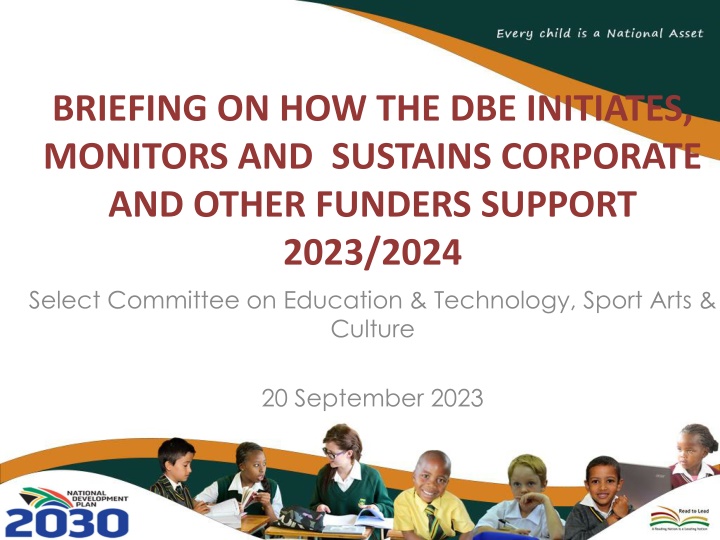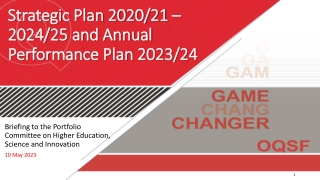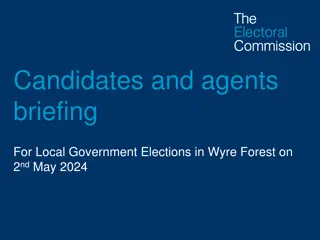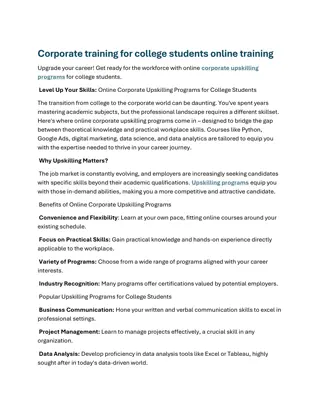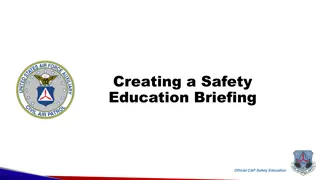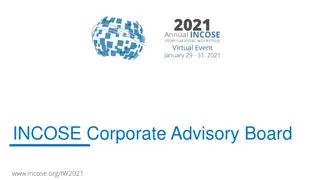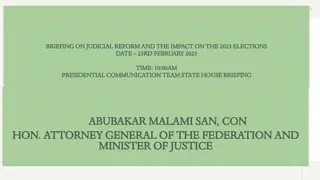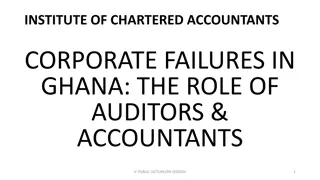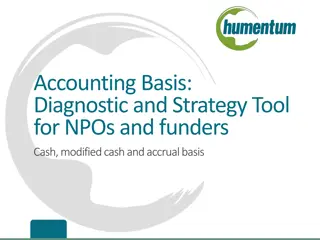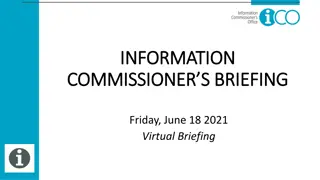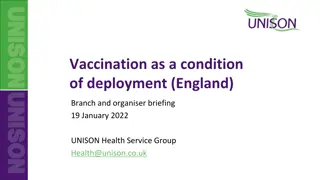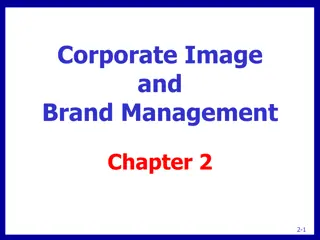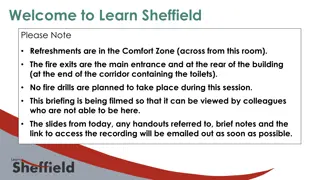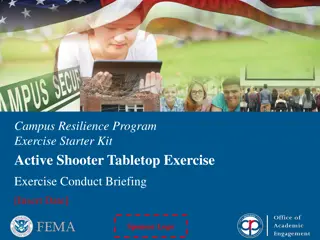Corporate and Funders Support in Education Initiatives: Briefing 2023/2024
The Department of Basic Education in South Africa emphasizes the importance of partnerships to enhance education quality and achieve goals outlined in the Action Plan 2019. The brief covers how the DBE initiates, monitors, and sustains corporate and other funders' support, highlighting the enabling environment, partnership pillars, policy implementation, and evaluation mechanisms. Partnerships are seen as essential for improving service delivery, utilizing resources efficiently, ensuring good governance, and engaging diverse stakeholders for societal impact.
Download Presentation

Please find below an Image/Link to download the presentation.
The content on the website is provided AS IS for your information and personal use only. It may not be sold, licensed, or shared on other websites without obtaining consent from the author.If you encounter any issues during the download, it is possible that the publisher has removed the file from their server.
You are allowed to download the files provided on this website for personal or commercial use, subject to the condition that they are used lawfully. All files are the property of their respective owners.
The content on the website is provided AS IS for your information and personal use only. It may not be sold, licensed, or shared on other websites without obtaining consent from the author.
E N D
Presentation Transcript
BRIEFING ON HOW THE DBE INITIATES, MONITORS AND SUSTAINS CORPORATE AND OTHER FUNDERS SUPPORT 2023/2024 Select Committee on Education & Technology, Sport Arts & Culture 20 September 2023
Presentation Outline Purpose Background and Introduction Enabling Environment Pillars of Partnerships Partnerships Policy, Protocol and Implementation How to initiate a partnership with the DBE Monitoring and Evaluation of Partnerships Auditing and Scrutiny Arrangements of Partnerships 2
PURPOSE To provide The Select Committee with information on how the Department of Basic Education initiates, maintain and sustain partnerships that will enhance our efforts of providing education. quality public 2
INTRODUCTION AND BACKGROUND Education is an apex priority of the government of South Africa and addressing its challenges is considered a societal issue. As such, the Department of Basic Education has developed a sectoral plan, Action Plan 2019-Towards the realisation of Schooling 2030, to map the development trajectory of education. The Department of Basic Education recognises the strength and value of effective partnerships in contributing to the improvement of quality education and supporting the attainment of the goals identified in Action Plan 2019-Towards the realisation of Schooling 2030. 8
INTRODUCTION AND BACKGROUND The Department of Basic Education believes that partnerships can deliver: Added Value, in particular where service delivery is unlikely or difficult to achieve but can be more effectively delivered in collaboration with other partners and/or agencies Value for Money, when available resources are used economically, yet effectively achieve delivery outputs Good Governance, when programmes are transparent, consistent and well managed i.e. fit for purpose Enhance our goal of making education a societal matter by actively involving communities, businesses, organized labour and non-governmental organisations. 8
ENABLING ENVIRONMENT All partnerships with the Department of Basic Education are underpinned by the primary aim of improving the quality of basic education as spelt out in Action Plan 2014-Towards the realisation of Schooling 2025. NEDLAC Accord on Basic Education and Partnerships with Schools NEDLAC, established in 1995, is a forum designed to promote social dialogue and brings together government, business, labour and civil society to promote the goals of economic growth and social equity in a more inclusive and transparent manner. The National Development Plan 2030 (NPD) The National Planning Commission (NPC) through the National Development Plan 2030 (NPD) mapped out the vision and national development path for the country. According to the NDP, quality basic education in all public schools is critical to the success of the NDP. The National Education Collaboration Framework and Trust (NECT) The NECT was launched by the Presidency on 16 July 2013 as the first practical embodiment of the National Development Plan. Central to the NECT is the need to set up effective mechanisms for driving the collaboration envisaged in the NDP. The Public Finance Management Act - Assented to 2 March 1999 (PFMA) The PFMA regulates financial management in the national and provincial governments; to ensure that all revenue, expenditure, assets and liabilities of those governments are managed efficiently and effectively Action Plan 2019-Towards the realisation of Schooling 2030 6
PILLARS OF PARTNERSHIPS The DBE has identified the following partnership pillars which are not necessarily mutually exclusive from each other: Volunteer and Capabilities Pillar: This pillar focuses on non monetary contributions, and critical capabilities needed to transform education, which would include amongst others; contributions in kind by volunteering services e.g. volunteer teachers, contributing media space and airtime, pro bono skills and expertise. Financial Pillar: This pillar focuses on purely financial contributions made to programmes and projects, and also include event sponsorships. Priority Pillar: These include monetary and non-monetary contributions that directly support any DBE priority programmes such as; Infrastructure, National School Nutrition Programme, Teacher Development, Curriculum Support, Early Childhood Development, School Safety, School Sport and Enrichment Programmes as well as Special Ministerial Projects such as the National Teaching Awards, Annual Mandela Day, the annual Announcement of Matric results and Disaster Relief in schools. Research, Innovation and Support Pillar: This would include smaller projects that are creative and innovative attempts to improve the quality of education. This pillar also includes research partnerships. Advocacy Pillar: This pillar refers to partnerships that support mobilisation campaigns, specific events, exhibitions and functions, monthly newsletter and the general advocacy campaigns of Department of Basic Education programmes. 7
PARTNERSHIPS POLICY, PROTOCOL AND IMPLEMENTATION Based on our enabling environment, the DBE has developed clear policies and processes to formalize and implement partnerships. Partnerships Framework When considering whether to get involved in a partnership, the DBE will make a decision having examined the issues set out in the Partnership Framework in consultation with the Action Plan 2019-Towards the realisation of Schooling 2030. PartnershipsProtocol The purpose of the partnership protocol is to enable the DBE, its officials and partners to ensure that the partnerships that the DBE engages in are appropriate and are manageable. The protocol sets out a goals for the partnership that will assist both the DBE and partners Partnerships with the DBE cannot be implemented in an ad hoc manner. Rather, there are clear parameters that govern the processes and outcomes of the partnership. To this end, the DBE has highlighted the need for an official protocol on partnerships. Partnerships Implementation 8
How to initiate a partnership within the DBE and its Legal Status Partnerships can be very rewarding and deliver outstanding results for public schools, however, it can also be difficult and is generally resource intensive, especially in the early stages. Any participation in partnerships by the Department of Basic Education should be approved through the appropriate management levels. This process applies to all partnerships irrespective of the size, importance and impact of the partnership. The merits for all proposed partnerships will be measured against the aims and goals of the DBE, specifically the Action Plan 2014, Towards Schooling 2025. It is important to understand the distinction between what many normally refer to as partnerships and a formally constituted legal partnership. The different roles that the Department of Basic Education play in partnerships need to be clearly understood. The status of any partnership should be clear. A Partnership Implementation Protocol is required to define how partners will work together. The Directorates: Partnerships in Education will assist in facilitating this process with the relevant Branch and the DBE Legal Services will advice on the Partnership Implementation Protocol. The partnership is finalised upon approval of the Director General of the Department of Basic Education who is signatory to the Partnership Implementation Protocol. 9
How to initiate a partnership within the DBE and its Legal Status A comprehensive list of requirements to form a partnership with the DBE has been developed and shared with potential partners. This is to ensure that partners are compliant and have the resources to sustain the partnership. Consideration and the approval of a partnership is based on the value of the partnership to the DBE The Director General approve that the DBE may enter into partnership prior to Legal Services and Partnerships involvement and conclusion of partnership agreements. A Memorandum of Understanding or Memorandum of Agreement (MoU or MoA) are signed which guides the maintenance of the partnership and ensure its sustainability. The Agreement provide clear roles and responsibilities of each stakeholder party to the agreement. The Partnerships and Legal Directorates assist in the vetting of the partnerships entered into by the DBE with the private entity. A steering Committee, comprising of officials in the Implementing Directorate within the DBE, and partner representative/s is formed in order to evaluate and monitor the implementation and results of the partnership. 10
Monitoring and Evaluation of Partnerships The DBE s involvement in partnerships is reviewed regularly, in order to ensure the continuing relevance to the Department of Basic Education s priorities. The evaluation of partnerships always cover two areas: 1. Evaluation of the partnership itself; providing assurance that proper systems are in place and that its outcomes and performance match the goals and intentions of the partnership are monitored. 2. The Department of Basic Education must decide whether its objectives are being met and be assured that the partnership is effective. The monitoring and evaluation process will inform the Department of Basic Education what decisions to take in order to ensure the partnership is effective. This process may also assist in identifying that it is time for a partnership arrangement to cease, and/or for the Department of Basic Education to leave a partnership arrangement. 11
Auditing and Scrutiny Arrangements of Partnerships The auditing and scrutiny arrangement for a partnership should be clear. The Department of Basic Education ascertain where responsibility for these functions lies. This is particularly important if a partnership manages or allocates the resources of its partners through any pooled or alignment arrangements. These arrangements should be clearly referenced in any partnership agreement and evidence of the work of partnership activities must be captured in an electronic bank of evidence on the DBE server. The Department of Basic Education will only be represented on agreed partnerships by their respective Deputy Director-Generals in collaboration with the Director-General. Representation on any partnership does not permit any official to commit the Department of Basic Education to use any resources not contained within approved budgets nor to act as a public spokesperson for the Department of Basic Education. The Legal Services of the Department of Basic Education provide any necessary advice and guidance to its representatives on partnerships regarding potential liabilities for them and the Department of Basic Education, and in their responsibilities and accountabilities. 12
